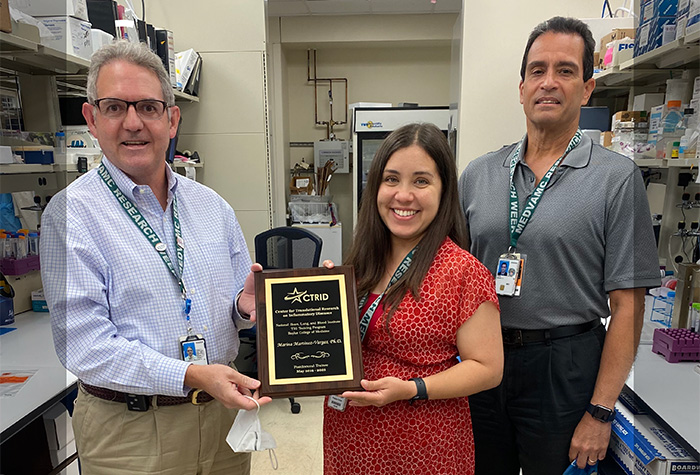Office of Research & Development |
 |
Office of Research & Development |
 |


Former CTRID T32 trainee Dr. Marina Martinez-Vargas receiving her graduation award from CTRID Director Dr. Rolando Rumbaut (left) and her primary mentor Dr. Miguel Cruz (right).
May 24, 2024
By Tristan Horrom
VA Research Communications
"If our program were only a VA standalone program and it had no affiliation with Baylor, I think it would be difficult for us to get this program in the first place and to attract a talented group of individuals. That partnership is truly synergistic and of mutual benefit to VA and the medical school."
The Center for Translational Research on Inflammatory Diseases (CTRID) at the Michael E. DeBakey VA Medical Center in Houston received five years of renewed funding for a collaborative research training program in thrombosis and inflammation on May 1.
The CTRID program is the only funded research training program of its type in the nation that focuses specifically on both thrombosis, or blood clot formation, and inflammation. These two inter-related conditions coexist in a broad range of conditions that affect Veterans, including sepsis, cancer, COVID-19, coronary artery disease, stroke, and traumatic brain injury.
Dr. Rolando Rumbaut, who heads CTRID along with Dr. Miguel Cruz, described the greatest strengths of the training program as “collaboration, partnership, and diversity,” highlighting how VA and the Baylor College of Medicine work together, how the multidisciplinary faculty work together to advance research, and how the diverse group assembled for the program strengthens the research community as a whole.
The training program, which began in 2018 as a collaboration between VA and the Division of Thrombosis Research at the Baylor College of Medicine, will be funded for five more years through a T32 training grant from the National Institutes of Health’s National Heart and Lung Blood Institute, allowing for the training of four new post-doctoral mentees per year in the combined thrombosis/inflammation field. Twelve trainees have been enrolled in the program since its inception.
Mentees undergo a hands-on, two-to-three-year research training program enriched with classes and a research seminar series. All mentors working at CTRID are experts in their fields and hold dual appointments with both VA and Baylor, as do the trainees. So far, about half of the trainees have been early-career physician investigators, many of whom devote a portion of their time to additional clinical duties or training while enrolled in CTRID’s training program.
The CTRID mentorship program is a prime example of what VA can accomplish when it collaborates with its academic affiliates. While housed on the Michael E. DeBakey VA Medical Center campus, CTRID is a joint venture between VA and Baylor with both committed to the success of the center and recruitment of the best trainees possible.
“If our program were only a VA standalone program and it had no affiliation with Baylor, I think it would be difficult for us to get this program in the first place and to attract a talented group of individuals,” Rumbaut explained. “That partnership is truly synergistic and of mutual benefit to VA and the medical school.”
By training the next generation of researchers, the program strengthens both the thrombosis/inflammation research community as a whole and, more specifically, the VA research enterprise. A great example of this is Dr. Justin Courson, who after completing the CTRID training program, recently received a Career Development Award from VA to study traumatic brain injury. This is just one example of post-doctoral trainees in the program going on to receive VA appointments, which Rumbaut described as the “optimal result” of the program.
Rumbaut and Cruz both stressed the importance of accepting both physician-scientists with M.D.s and scientists with Ph.D.s, allowing for both to be trained in biomedical research and translational medicine with direct interaction with patients in clinical settings. This hands-on approach gives trainees the opportunity to understand how their research will directly affect Veterans and other patients.
Furthermore, physicians and Ph.D.s often approach a problem from different perspectives, meaning the trainees also learn from each other while learning from their mentors, Cruz said. Likewise, the CTRID faculty, while representing many different specialties ranging from blood disorders to cancer to autoimmunity, frequently collaborate with one another to create an environment in which trainees can gain a wide breadth of research experience.
Another major strength of the CTRID training program is how it has been able to promote diversity in research by encouraging researchers from groups traditionally underrepresented in the research community. Since its inception, 75% of trainees to graduate from the program have been women, while 42% are from racial or ethnic groups traditionally underrepresented in medicine.
“Diversity is the right thing to do,” said Rumbaut. “We get the best research by having a diverse workforce.”
CTRID’s diverse training program demonstrates how collaboration with academic affiliates is a major strength of the VA research program. So much so that Dr. Carolyn Clancy, VA Assistant Under Secretary for Health for Discovery, Education and Affiliated Networks, spoke about the importance of the VA-Baylor research partnership at a symposium May 15 at the Houston VA, as part of VA Research Week. The symposium also included talks by other VA and academic leaders, including Dr. Rumbaut and Baylor College of Medicine president Dr. Paul Klotman.
VA Research Currents archives || Sign up for VA Research updates